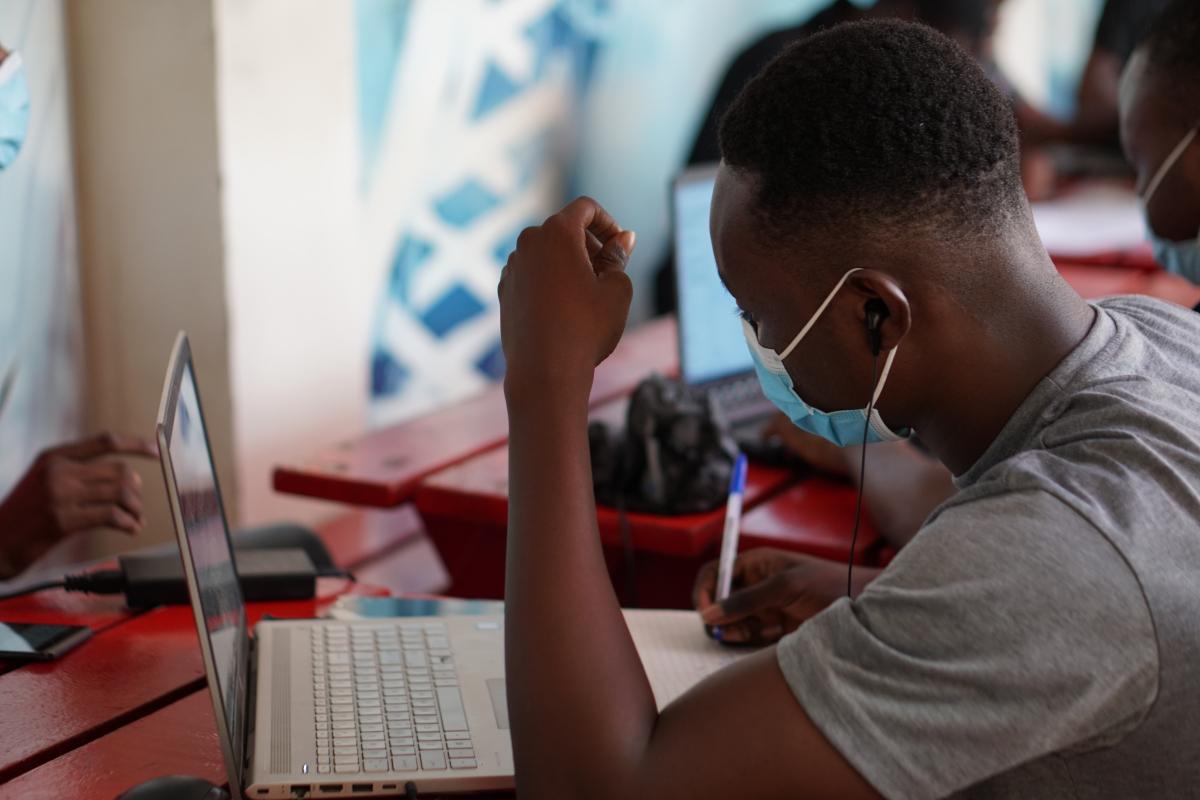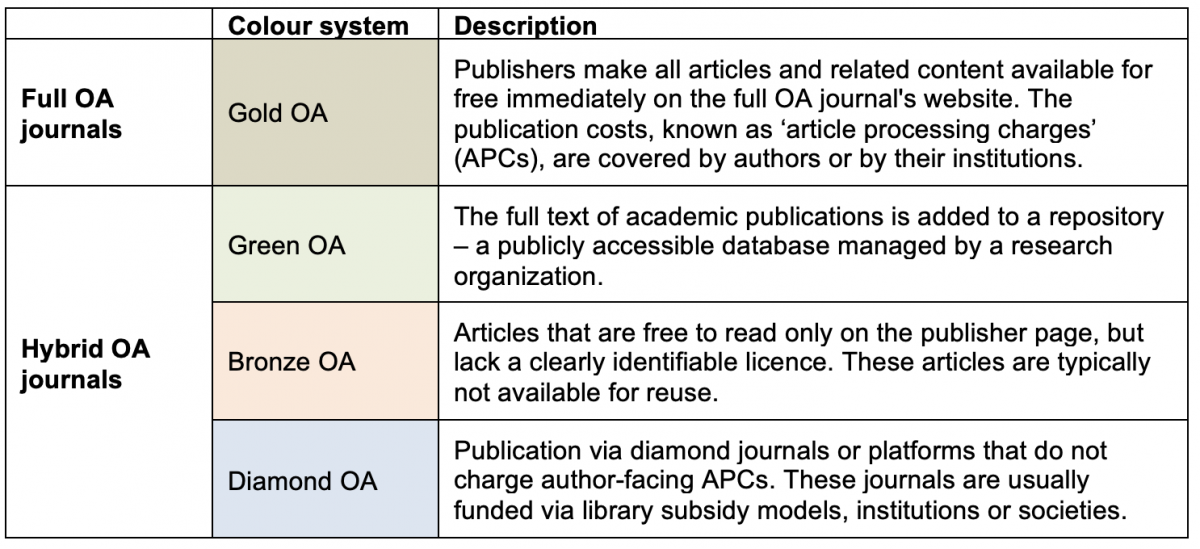
Image courtesy of Kojo Kwarteng, Unsplash
What is Open Access?
As the world continues to grapple with the uncertainties that the COVID-19 pandemic presents, the need for accessible, rigorous, unbiased knowledge has never been more urgent. However, this need stands in the wake of a barrage of misinformation, disinformation, and ‘fake news’.
In spite – or perhaps because – of this, the Open Access (OA) movement has gained even greater traction over the past 18 months, in an effort to make research on COVID-19 more widely available and to make research in other fields accessible to remote teachers and learners. But what is OA? Why is it increasingly important and how has COVID-19 advanced the OA cause?
OA is a set of principles and a range of practices through which research outputs are distributed online, free of cost or other access barriers, providing users with full re-use rights.[1] OA seeks to make research and data available for anyone, anywhere in the world to read, use, and build upon the knowledge, thus making knowledge outputs more valuable to a greater number of people.[2]
Open access can be applied to any published research output, including peer-reviewed and non peer-reviewed academic journal articles, conference papers, theses, book chapters, monographs, research reports, and images. OA journals are categorized using a simple colour system.[3],[4]
Table 1 The OA publishing system

OA can, to an extent, be contrasted with ‘traditional’ publishing models for research outputs, with often exorbitant journal subscription fees that have consistently outpaced the consumer price index by a factor of four to five over the past three decades.[5] The high cost of journal subscription fees has meant that educational institutions, educators, researchers, and students may be locked out by paywalls and often cannot afford to access these articles, or are forced to buy them without knowing whether the content is relevant for their purposes. Moreover, publishing in scholarly peer reviewed journals usually involves long delays from submission to publication, which takes an average of nine months. This is partially due to the length of the peer review process, but can also be attributed to the prevailing tradition of publishing in issues – which has become less relevant because of the digitization of materials. This custom ultimately creates backlogs of manuscripts awaiting publication.[6]
Open Access during COVID-19
Why is OA more relevant now than ever before? The last 18 months has provided an extraordinary research context in which researchers have bypassed traditional systems to provide up-to-date research and findings about the evolving COVID-19 pandemic. As a group of United States-based patient and disease advocacy organisations recently noted, ‘information critical to health should no longer be held hostage by arcane publishing’[7].
Throughout the pandemic, researchers have embraced open publishing platforms and preprint servers to disseminate their findings as rapidly as possible. The first article related to COVID-19 was published on bioRxiv on 19 January 2020 – just 20 days after the Chinese government informed the World Health Organization (WHO) of the impending COVID-19 threat. The article was licensed under a CC BY-NC-ND 4.0 International licence.[8] Some publishers have committed to publishing scientific articles relating to the disease as OA. Others are facilitating rapid open peer review and expediting the publishing of related research. The Pulitzer Prize-winning journalist Michael Hiltzig refers to this convincing demonstration of the value of OA to scientific research as one of the most important positive disruptions caused by COVID-19.[9]
At a practical level, the adoption of open practices has ignited collaboration and interaction amongst the scientific community. As Heather Joseph, the executive director of SPARC explains,
One of the things that COVID is showing us is that when scientists start openly pooling their data and articles, they start to have conversations about science in real time. Instead of waiting months for key findings to be published, scientists are sharing their findings on the sorts of channels many people use every day—such as Slack and Twitter.
This demonstrates how OA is part of the evolution of research publishing and in so doing, how it has contributed to our understanding of the disease. It is easy to see how the greater availability of information has propelled more rapid progress in various areas relating to COVID-19 – freely available scientific information has never been more necessary than in this age, where misinformation from unidentifiable or unrecognised sources muddies the waters between fact and fiction. But how has the pandemic highlighted the need for more people to consider making their research and data OA?
What about other research?
While most COVID-19 related studies were commendably made freely available to all, much of the world’s publicly funded university research remains hidden behind paywalls. However, the tide seems to be turning. Publishers, research institutions, and funders are collaborating to deliver high-quality OA publications for free at the point of publication.[10]
Efforts to remove journal paywalls have also gained significant traction since 2018, when an influential group of research funders announced that the scientists they fund should publish their peer-reviewed papers outside journal paywalls. This initiative, named Plan S, created instantaneous speculation over its efforts to eliminate journal subscription models. After many deliberations over policy, the project officially began in 2021, with 25 funding agencies rolling out similar OA mandates.[11] This has catalysed a significant shift, as an article in Nature explains,
Despite the complexity it’s brought, Plan S has already catalysed a shift in the OA landscape, advocates say. Journals that previously offered no route to make peer-reviewed articles immediately OA now do — even if only for authors with Plan S funders — and there’s been a blossoming of experiments with OA business models.[12]
Other significant developments include the global OA advocacy initiative OA2020’s efforts to implement transformative agreements in transitioning scholarly journals to OA. Transformative agreements allow users to repurpose former subscription payments to cover open publication of a country’s or institution’s research articles, thus eliminating author-facing article processing charges. Transformative agreements also allow one to restructure financial streams, creating enabling conditions for OA publishing and a more transparent, competitive market.[13]
In Africa, Côte d’Ivoire has launched a country-level Open Access repository, while Ethiopian university and government stakeholders have implemented OA policies for repositories, journals and infrastructures. In South Africa, institutions like University of Cape Town and University of the Witwatersrand have made similar inroads in promoting OA, with the former institution developing a continental platform for publishing OA journals, monographs and textbooks in Africa.[14] In addition, countries such as Ghana, Malawi, and Uganda, have finalized their national policies for data and repository management.[15]
These kinds of arrangements have contributed to significant progress in mainstreaming OA. Piwowar et al estimate that, as of 2019, approximately 31% of all journal articles are available as OA and 52% of article views are to OA articles. Given these trends, they project that, by 2025, 44% of all journal articles will be available as OA and 70% of article views will be to OA articles.[16] However, there is still a lot of work to be done, as noted in a recent article:
In addition to and sometimes combined with geopolitical arguments and regional skepticism, active attempts to discredit open access as “bad science” are never far from the surface, e.g. the insinuation that open access publications may not be properly peer reviewed or that the APC model inevitably leads to lots of publications with questionable merit.[17]
This drives home the point that OA requires a consistent commitment to make sustainable – and sometimes incremental – gains in realising its goals. The current COVID-19 crisis highlights the importance of unfettered access to scientific and scholarly information, for researchers, educators, students, journalists and non-academic professionals alike. But sustainable change needs to happen at both the systemic and individual levels. Ultimately, it is not a question of whether OA is better than other publishing models, but rather of how OA can enhance a more equitable publishing ecosystem and thus make knowledge and data more accessible.
For more information on how to publish OA research, OER Africa has created a learning pathway to give you practical guidance for doing so. Visit Publish Using Open Access to access this tutorial. Other learning pathways are available here.
Related articles:
- What is Open Science and how does it relate to open knowledge?
- Sharing Africa’s knowledge through open data
- How can OpenCourseWare help you to improve your courses?
Access the OER Africa communications archive
[2] Open Access Weeks. (2012). PhD comics. Retrieved from https://upload.wikimedia.org/wikipedia/commons/transcoded/7/71/PhD_Comics_Open_Access_Week_2012.ogv/PhD_Comics_Open_Access_Week_2012.ogv.360p.webm
[4] Open Access.nl. (nd). What is Open Access? Retrieved from https://www.openaccess.nl/en/what-is-open-access
[5] Burns, P. (2017). Academic journal publishing is headed for a day of reckoning. The Conversation. Retrieved from https://theconversation.com/academic-journal-publishing-is-headed-for-a-day-of-reckoning-80869
[6] Björk, B. and Solomon, D. (2013). ‘The publishing delay in scholarly peer-reviewed journals’. Journal of Infometrics. Retrieved from https://www.researchgate.net/publication/259165321_The_publishing_delay_in_scholarly_peer-reviewed_journals
[8] Kiley, R. (2020). ‘Open access: how COVID-19 will change the way research findings are shared’. Wellcome. Retrieved from https://wellcome.org/news/open-access-how-covid-19-will-change-way-research-findings-are-shared
[9] Tavernier, W. (2020). ‘COVID-19 demonstrates the value of open access: What happens next?’ Association of College and Research Libraries. Retrieved from https://crln.acrl.org/index.php/crlnews/article/view/24414/32251
[10] Boyle, P. (2021). ‘Covid-19 underlines the need for full open access’. Times Higher Education. Retrieved from https://www.timeshighereducation.com/blog/covid-19-underlines-need-full-open-access
[11] Else, H. (2021). ‘A guide to Plan S: the open-access initiative shaking up science publishing’. Nature. Retrieved from https://www.nature.com/articles/d41586-021-00883-6
[12] Else, H. (2021). ‘A guide to Plan S: the open-access initiative shaking up science publishing’. Nature. Retrieved from https://www.nature.com/articles/d41586-021-00883-6
[13] Open Access 2020. (2020). OA2020 Progress Report. Retrieved from https://oa2020.org/wp-content/uploads/OA2020-Progress-Report-December-2020.pdf
[14] Makoni, M. (2021). New continental platform for open access publishing. University World News. Retrieved from https://www.universityworldnews.com/post.php?story=20210203114558607
[15] Markin, P. (2020). Open Access in Africa, Institutional Repository Development and Open Science Challenges. Open Research Community. Retrieved from https://openresearch.community/posts/open-access-in-africa-institutional-repository-development-and-open-science-challenges?channel_id=2448-players
[16] Piwowar, H., Priem, J. and Orr, R. (2019). ‘The Future of OA: A large-scale analysis projecting Open Access publication and readership’. bioRxiv. Retrieved from https://www.biorxiv.org/content/10.1101/795310v1
[17] Spichtinger, D. (2020). ‘Not yet the default setting – in 2020 open research remains a work in progress’. London School of Economics. Retrieved from https://blogs.lse.ac.uk/impactofsocialsciences/2020/01/17/not-yet-the-default-setting-in-2020-open-research-remains-a-work-in-progress/
